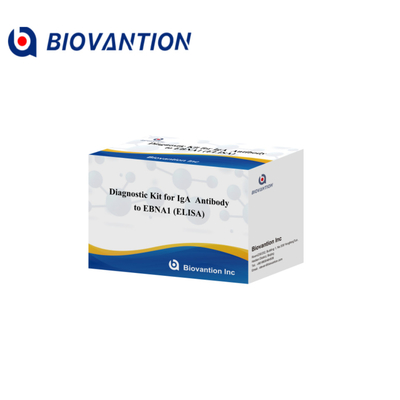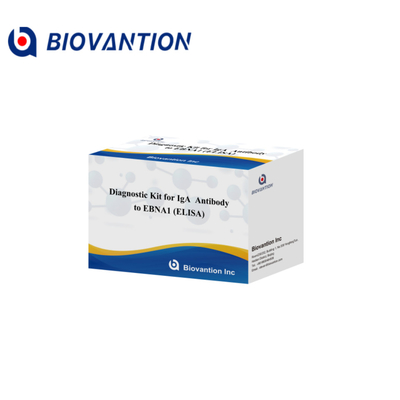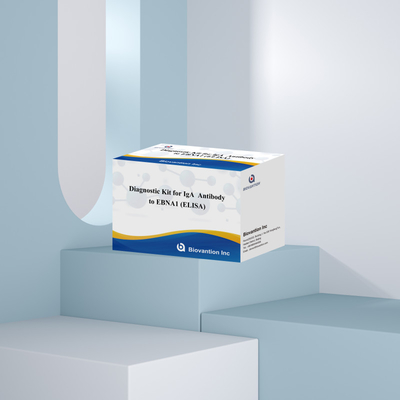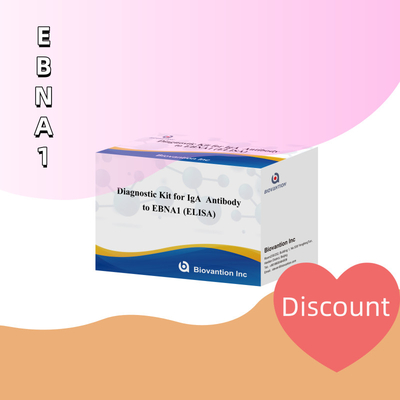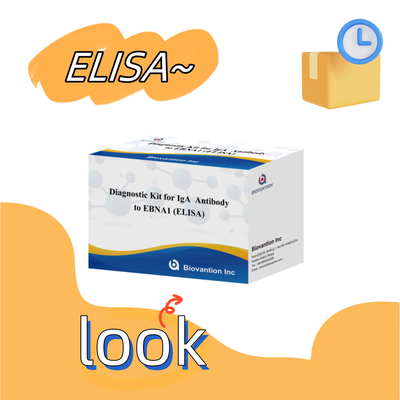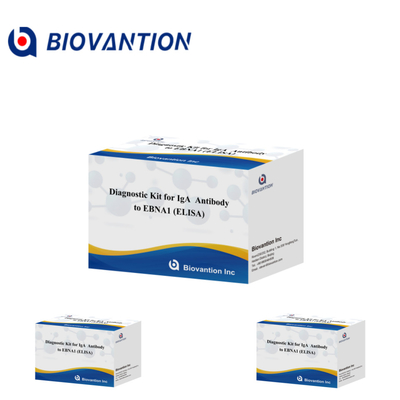Product Description:
The Diagnostic Kit for IgA Antibody to EBNA1 (ELISA) operates based on the principle of Enzyme-Linked Immunosorbent Assay (ELISA). Here’s how the principle applies specifically to detecting IgA antibodies against EBNA1:
1. **Coating**: The wells of a microplate are coated with recombinant or purified EBNA1 antigen. EBNA1 (Epstein-Barr Nuclear Antigen 1) is a protein expressed during latent infection by the Epstein-Barr virus (EBV).
2. **Sample Addition**: Patient serum or plasma samples, potentially containing IgA antibodies against EBNA1, are added to the coated wells.
3. **Antibody Binding**: If IgA antibodies specific to EBNA1 are present in the sample, they will bind to the EBNA1 antigens immobilized on the well surface.
4. **Washing**: After an incubation period allowing antibodies to bind, the wells are washed to remove unbound substances such as unreacted antibodies.
5. **Detection**: A secondary antibody specific to human IgA and conjugated to an enzyme (e.g., horseradish peroxidase or alkaline phosphatase) is added to the wells. This secondary antibody binds specifically to the IgA antibodies bound to EBNA1.
6. **Substrate Addition**: A substrate solution is added that reacts with the enzyme linked to the secondary antibody. This reaction produces a color change or a luminescent signal.
7. **Signal Measurement**: The intensity of the color or luminescence is measured using a spectrophotometer or a luminometer. This measurement is proportional to the amount of IgA antibodies bound to EBNA1 in the patient's sample.
8. **Quantification**: By comparing the measured optical density (OD) or luminescence against standard curves or controls, the concentration of IgA antibodies against EBNA1 can be quantitatively determined in the patient sample.
In summary, the ELISA principle used in the Diagnostic Kit for IgA Antibody to EBNA1 detects and quantifies IgA antibodies specific to EBNA1, a marker of Epstein-Barr virus (EBV) infection. This method provides a reliable tool for diagnosing and monitoring EBV-related diseases, such as infectious mononucleosis and EBV-associated cancers.
Features:
- Product Name: Diagnostic Kit for IgA Antibody to EBNA1 (ELISA)
- Applications: Diagnosis
- Format: Kit
- Sample Type: Serum, Plasma
- Storage Temperature: 2-8°C
Antibody Detection Assay Kit for ELISA Testing
ELISA Diagnostic Test Kit for Infectious Diseases
Applications:
The Diagnostic Kit for IgA Antibody to EBNA1 (ELISA) has several important applications in clinical and research settings:
1. **Diagnosis of EBV Infection**: The kit is primarily used in clinical laboratories to detect IgA antibodies specific to EBNA1 in patient serum or plasma samples. Elevated levels of IgA antibodies against EBNA1 indicate a past or current Epstein-Barr virus (EBV) infection.
2. **Monitoring Disease Progression**: It aids healthcare providers in monitoring the progression of EBV-associated diseases, such as infectious mononucleosis and EBV-related malignancies, by quantifying IgA antibody levels over time.
3. **Differential Diagnosis**: Helps differentiate EBV infections from other viral infections or conditions that may present with similar symptoms, based on the presence of specific IgA antibodies against EBNA1.
4. **Screening High-Risk Populations**: Useful in screening individuals at high risk for EBV-associated diseases, such as immunocompromised patients (e.g., transplant recipients) or individuals with suspected EBV reactivation.
5. **Epidemiological Studies**: Facilitates epidemiological studies by providing data on the prevalence of EBV infections within populations and identifying patterns of antibody responses to EBNA1.
6. **Research Purposes**: Enables researchers to study the immune response to EBV infection, investigate the role of EBNA1 in disease pathogenesis, and evaluate potential vaccine candidates or therapeutic interventions.
7. **Public Health Surveillance**: Contributes to public health efforts by monitoring the spread of EBV infections, assessing the effectiveness of prevention strategies, and guiding vaccination policies where applicable.
Overall, the Diagnostic Kit for IgA Antibody to EBNA1 (ELISA) plays a critical role in diagnosing EBV infections, monitoring disease progression, and supporting both clinical management and research efforts related to Epstein-Barr virus-associated diseases. Its application extends from individual patient care to broader public health initiatives aimed at controlling and preventing EBV infections and their associated complications.
Parameters:
| Speciman |
WB/S/P |
| Certificates |
GMP, ISO13485. ISO9001 |
| Size |
96T/BOX |
| store at |
2-8℃ |
| samples |
free |
| specification |
normal |
| Specificity |
> 98% |
| Accuracy |
99%+ |
| Read Time |
45-60 minutes |
| method |
ELISA |






 Your message must be between 20-3,000 characters!
Your message must be between 20-3,000 characters! Please check your E-mail!
Please check your E-mail!  Your message must be between 20-3,000 characters!
Your message must be between 20-3,000 characters! Please check your E-mail!
Please check your E-mail! 

